A Civ-style 4X game set exclusively in Greece, the Balkans and Western Anatolia, is that not a bit limiting?
Type: Singleplayer, Multiplayer
Genre: Strategy
Developer: Kube Games
Publisher: Kube Games
Release date: 30 Jul, 2020


Where would we be without the Civilization series? Over the decades there’s been innumerable games that draw their inspiration from Sid Meier’s groundbreaking game, some more successfully than others. Imperiums: Greek Wars is another game in the long line of 4X games that owe a lot to Sid, but like any good 4X strategy game, it puts its own spin on the formula.
In Imperiums: Greek Wars you take control of one of the many nations and city-states that existed in and around Greece, starting during the reign of Philip II of Macedonia. Through warfare, diplomacy and science you need to grow powerful, and dominate the region, either on a map that’s based on the real world, or a randomly generated one.
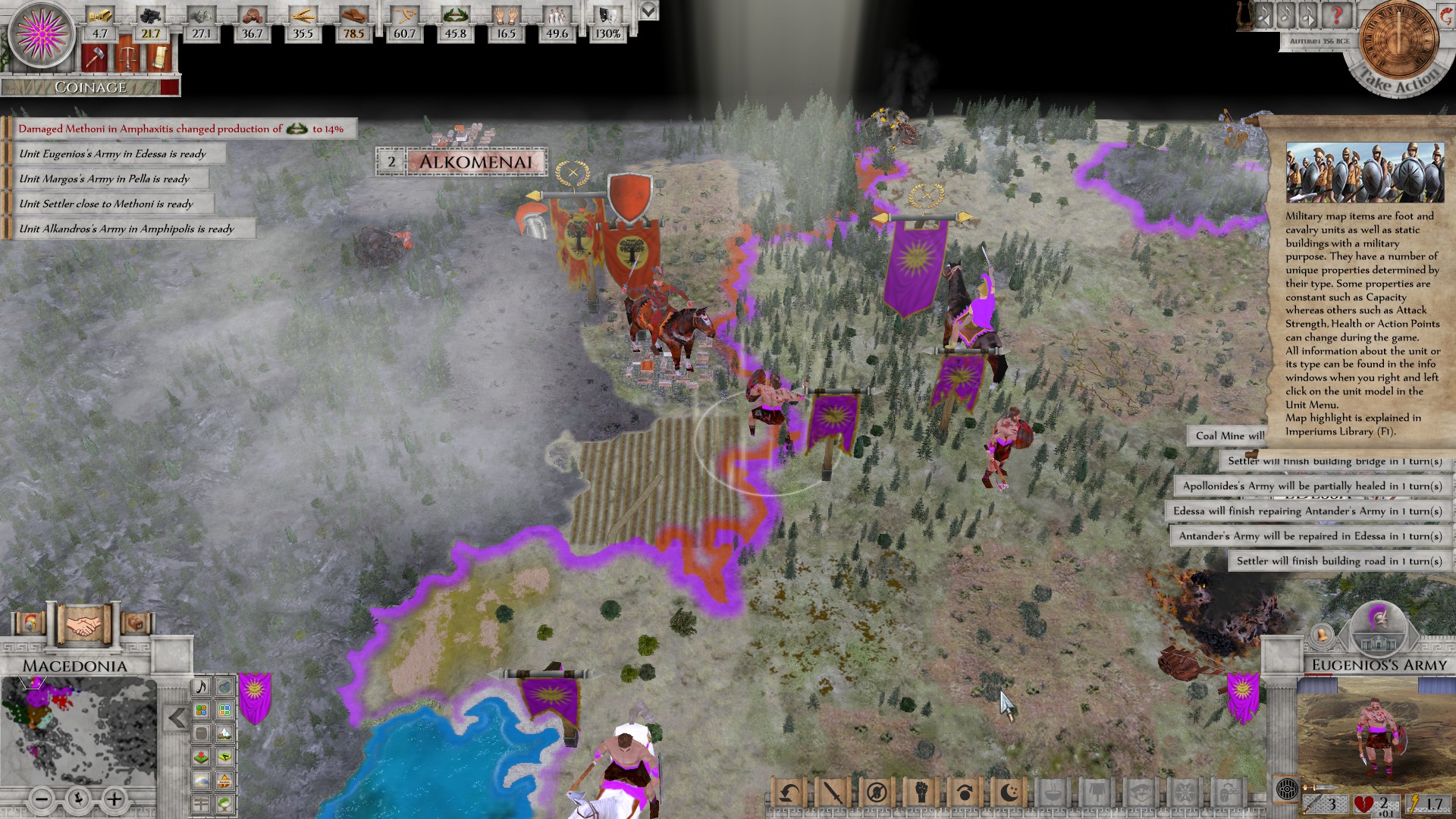
Setting
The year is 359 BC, Philip II has just taken the Macedonian crown. This is the man who would lay the foundation for the Macedonian empire, and who’s son would conquer almost all the land between Greece and India. In the east the old Achaemenid Empire is struggling to keep its unruly subjects in line. While no longer as powerful as it once was, it still, through its subjects, claims Anatolia as its own. In the south, the Greek states view themselves as the beacons of civilization and views Macedonia as little more than a backwater nation ruled by barbarians. And in the north, the Celtic tribes are viewing the rich lands of Greece and Anatolia with envy.
This is where the game starts. It’s a time of uncertainty, and no single nation is powerful enough to dominate the region.
Imperiums: Greek Wars is based on history, the nations depicted existed, the technology shown was used, and many of the things you have to worry about during gameplay were real issues back then. But the game is not a slave to history. It’s a 4X game first, and a historical game second. You’ve also got some mild supernatural elements in the game, like warriors from the underworld can appear and try to raid your mines (although one could argue that these supernatural elements force you to think more like they did back then, as for the people living in Greece at the time, they were “real”). These historical deviations are done with purpose though, they’re not just random misconceptions that keep being repeated.
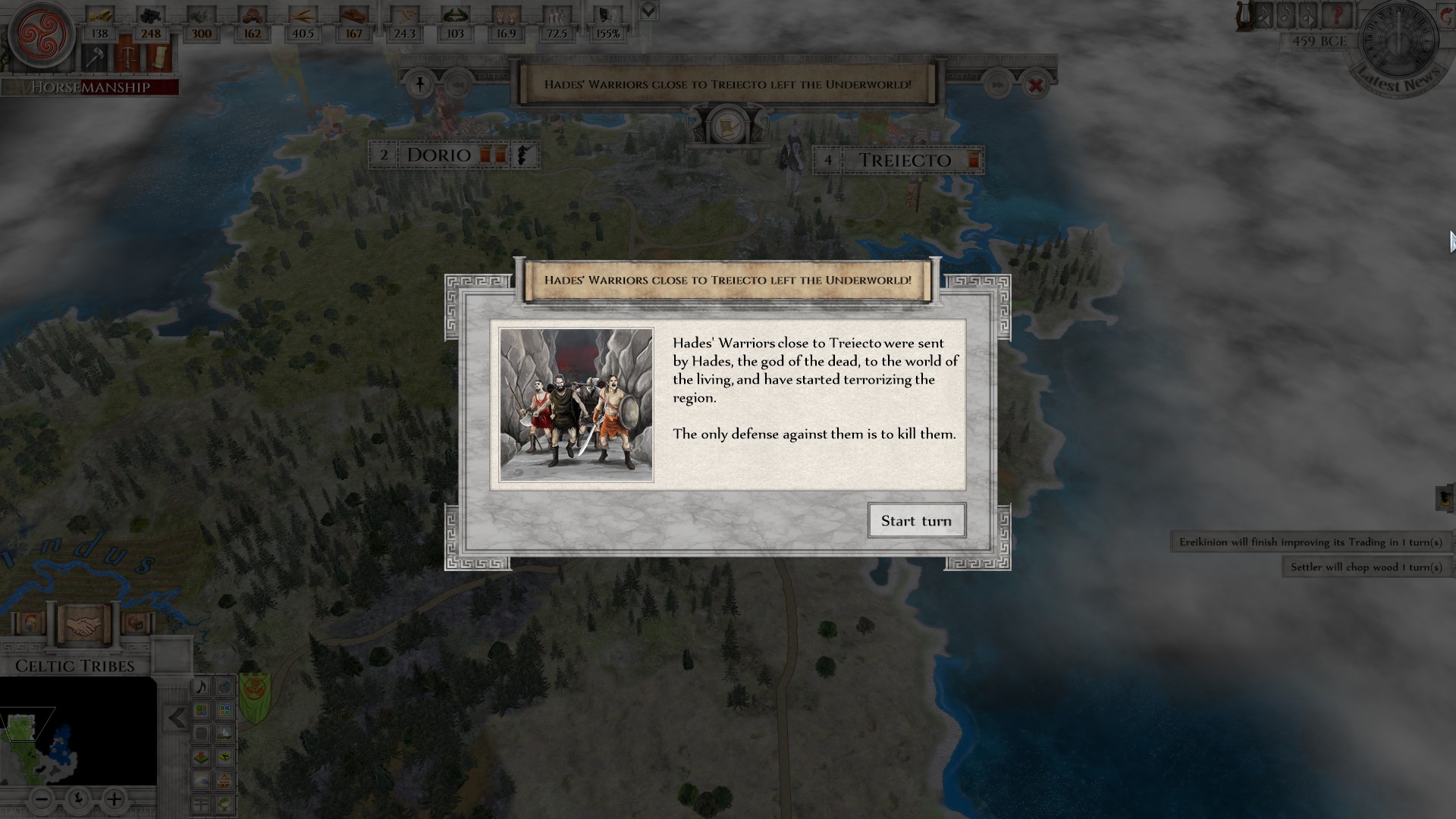
Presentation
There’s no denying it, Imperiums: Greek Wars looks old. While it runs at modern resolutions, most of the games assets look dated. The models for the different units look blocky, and textures have a blurry, low resolution look to them. Although the game should look a little bit better than shown in most screenshots in this review, as for some reason it kept resetting the shadow settings every time it was restarted. Even with the shadows turned on, it’s not a looker though. The map is made out of squares, so the coastline also ends up looking weirdly jagged.
Even if the graphics might not be great from a technical point of view, there’s some nice touches. Units from different nations look different, in order to represent how they looked historically. There’s also visible damage to units, cities and mines, so you can tell at a glance if repairs are needed.
The game sounds better than it looks. There’s a soundtrack that might not be entirely fitting for the time period, but as background music for a 4X strategy game about clashing empires, it sounds suitably grand. There’s also good feedback from the sound effects. When you select a or move units, they make an appropriate sound, one that makes it clear what happens, without getting annoying. You can tell a lot of what happens just from the sound effects, which is how it should be in a game like this.
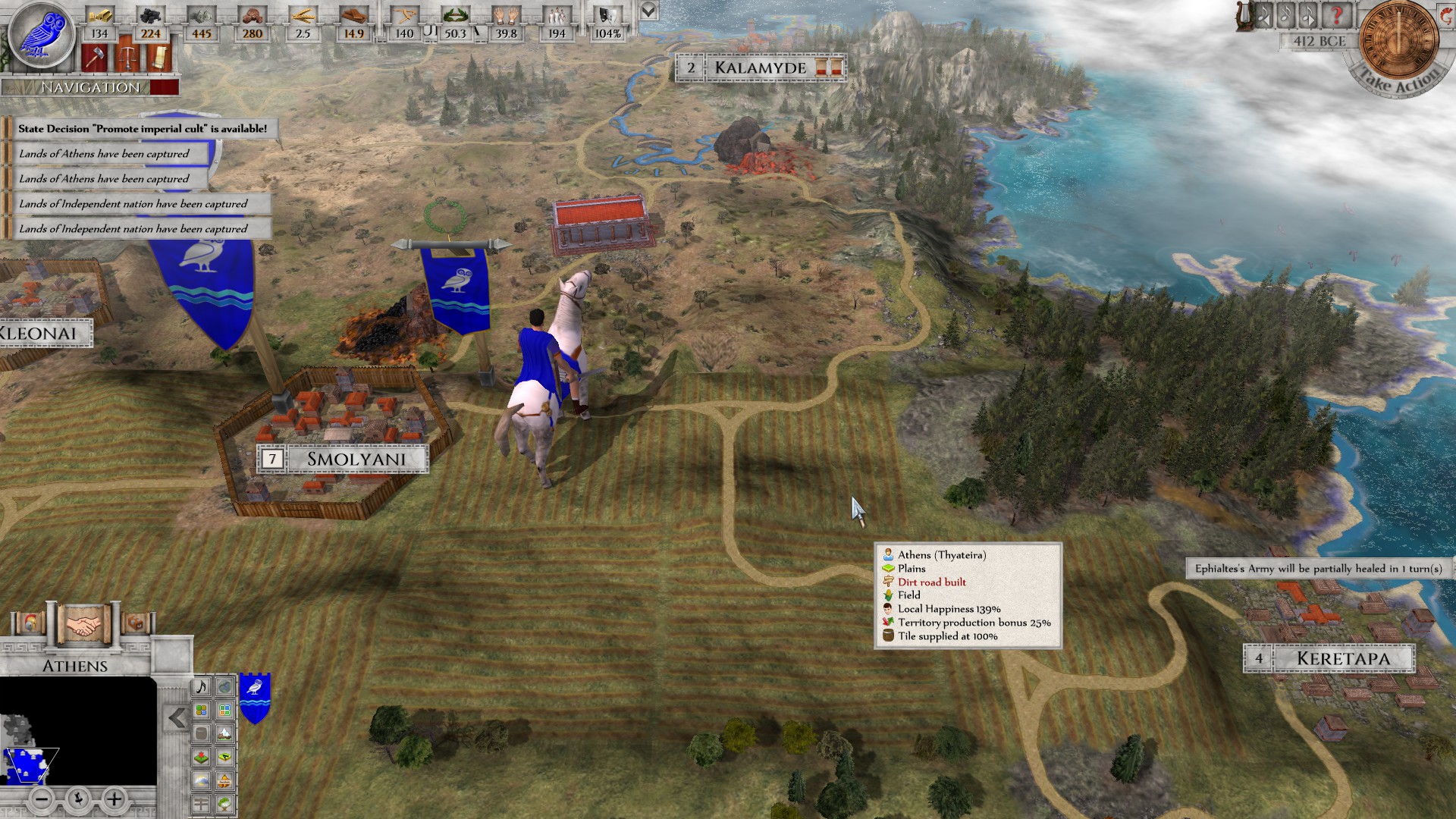
Gameplay
At first glance, this game might seem like a simplified, and scaled back Civilization 4, and if you’re going in blind, that’s likely to be the first impression you’ll get from it. A lot of the basic things, like unit movement, construction of improvements on the world map, and so on, work similarly to Civ 4. But looks can be deceiving, and there’s a lot more going on here than.
The first choice you need to make when setting up a game is how you want to play it. There are three options for what kind of map you’ll play one, one that covers Greece, one that covers the Balkans and western Anatolia, and then a fully randomized map. With the first two options, the nations are already established, and their locations and size are roughly historical, while with the third option you get a classic 4X start, that is the map is randomly generated, and everyone starts with just a few things (you can decide exactly how much you start with, but every nation gets the same things to start with).
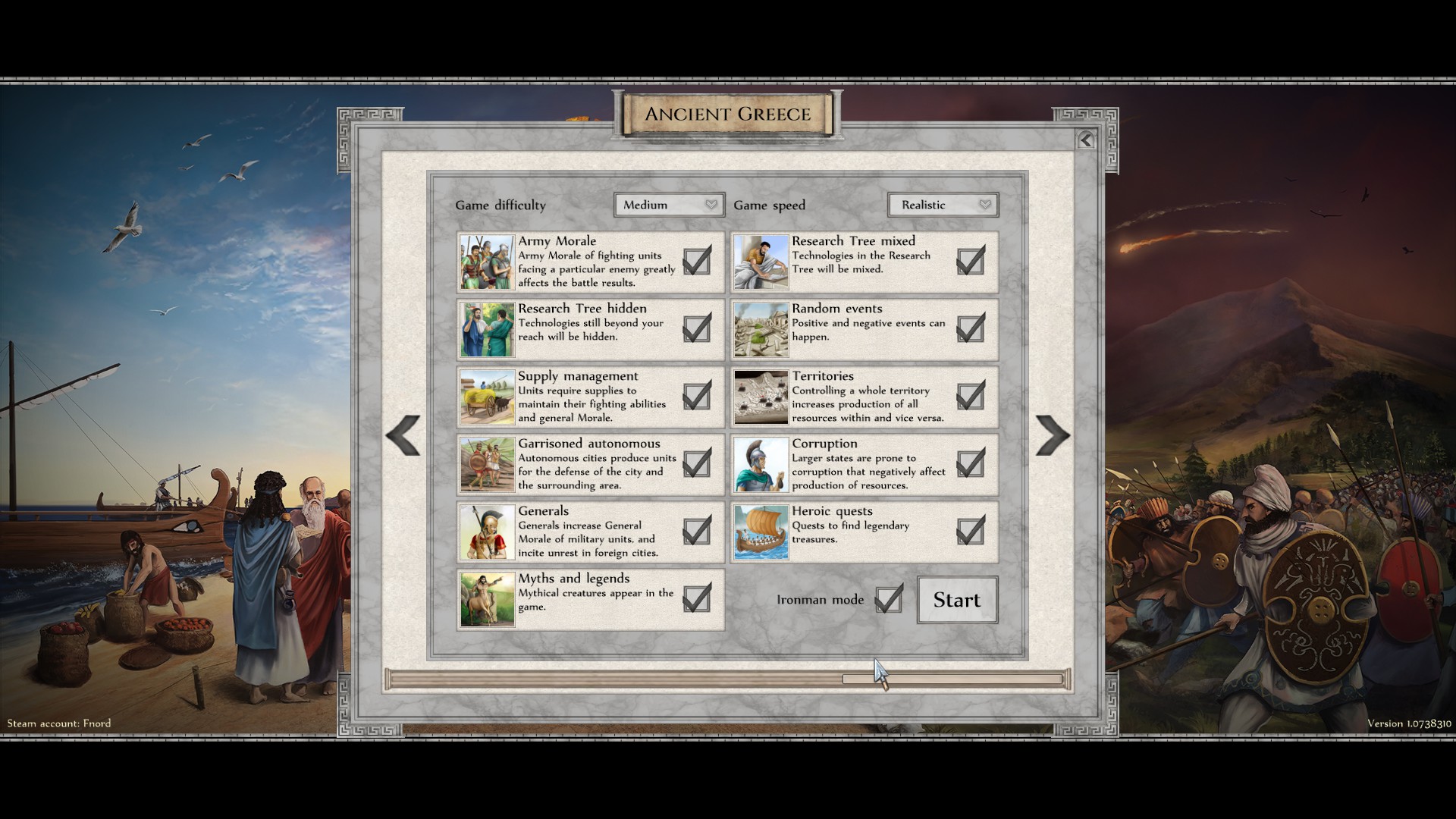
Once the game starts, it’s time to build your empire. If you’ve gone with one of the two pre-set maps, then most of the map will be owned by someone, and everyone will have a few cities and units already on the map, with the historically more powerful nations of course having more things to start with, so expanding past your borders will inevitably mean that you’ll have to fight your neighbours. If you’re going for the randomly generated map, you’ll have a bit more time for yourself, and you’ll be able to expand your borders without going to war. There are still neutral cities scattered around the map though, and these are not just passive players, they’ll actively send out units and expand on their own.
Empire building is done through the usual means, that is by conquering your neighbours, as well as building up your own cities, researching new technology, and trying to keep your people from getting so unhappy that they tear your empire apart. The later is easier said than done. Conquering your neighbours can be done in more than one way though. The most straight forward way is to just go in with a few armies, kill anyone who doesn’t think your flag belongs on the walls of their city, and then subjugate the population. This is messy and results in a lot of damage to the city, so you can try to influence and destabilize the city instead. By laying siege to a city, they’ll sooner or later surrender and join your cause, and you can also spend your influence points on trying to sway their people to your cause, causing them to join you without dealing (too much) damage to the city.
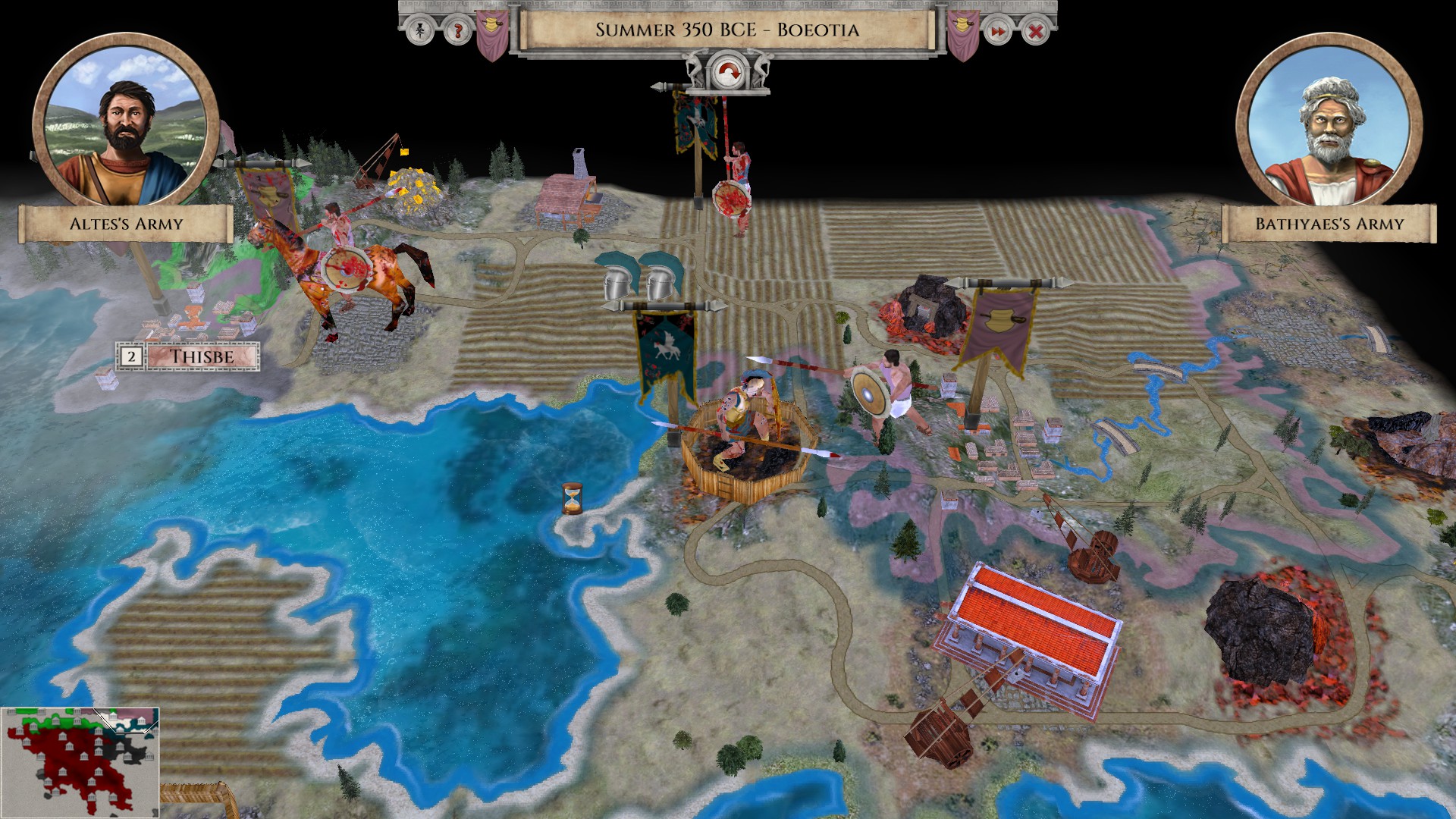
Improving your cities and their surroundings is a relatively straight forward affair. You’ve got settlers who can either found new cities (settlers are not the only unit that can do this, but they’re the ones best suited for the task), build roads, create fields that generate food, or cut down woods. Mines and quarries are already on the map when you start, and so your settlers don’t build those, but they can improve them by making sure that there’s a road that leads to them. There are also buildings that can be placed down on the map, like temples that increase the birth rate of all nearby cities, blacksmiths that further increase the output from mines, stables allow you to recruit cavalry units outside of cities, and so on. Finally, there’s the city improvements, things that can be built in your city and that don’t show up on the map.
In order to produce military units, you need to have researched the tech that unlocks them, “installed” them in the city you want to build them in (this costs some resources), and then have enough population and resources to actually build the unit. Your unit selection will depend on what nation you’re playing, and while every nation has rough equivalents, they do perform differently. Greek hoplites will beat Persian pikemen on open ground, but Persia has superior cavalry, and barbarians axemen at their best when they fight in difficult terrain such as forests. Once your units have been created you can train them further, at the cost of more time and resources. The exact type of training available depends on what technologies you’ve unlocked. Training is quite important, and makes a noticeable difference in how well a unit performs.
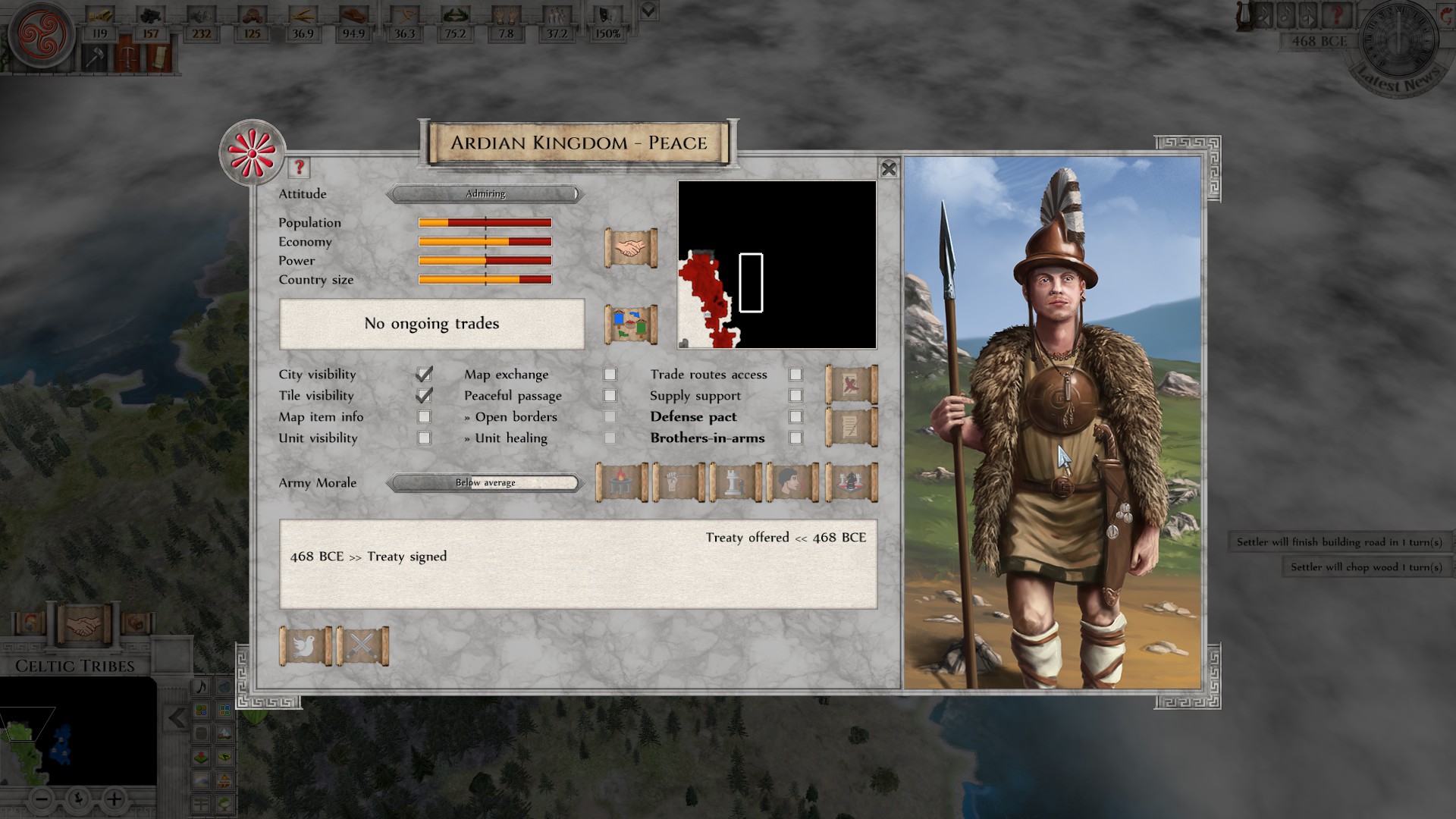
Research works similarly to other 4X games, but it does not feel quite as impactful as in games like say Civilization. You can’t ignore it if you want to do well, but it also does not feel like you’re getting these big leaps forward. This makes thematic sense, after all, the game takes place in a very specific time period, it would be weird if you suddenly made huge technological leaps, but it also makes researching a new thing feel less rewarding than in most other games of this type.
If you’ve played Civ, Master of Magic or any other game of this type, a lot of what’s said about Imperiums: Greek Wars probably sound very familiar, apart from maybe the ability to use influence to take over cities. But there’s a few things that sets this game apart from other games in the genre. One for one you’ve got a whole slew of “state decisions”. These allow you to spend resources in order to have different effects on your nation, usually both positive and negative ones. These include things like land reforms, changing the conditions for your slaves and other far reaching tings, as well as organizing military parades and games to appease your population short term.
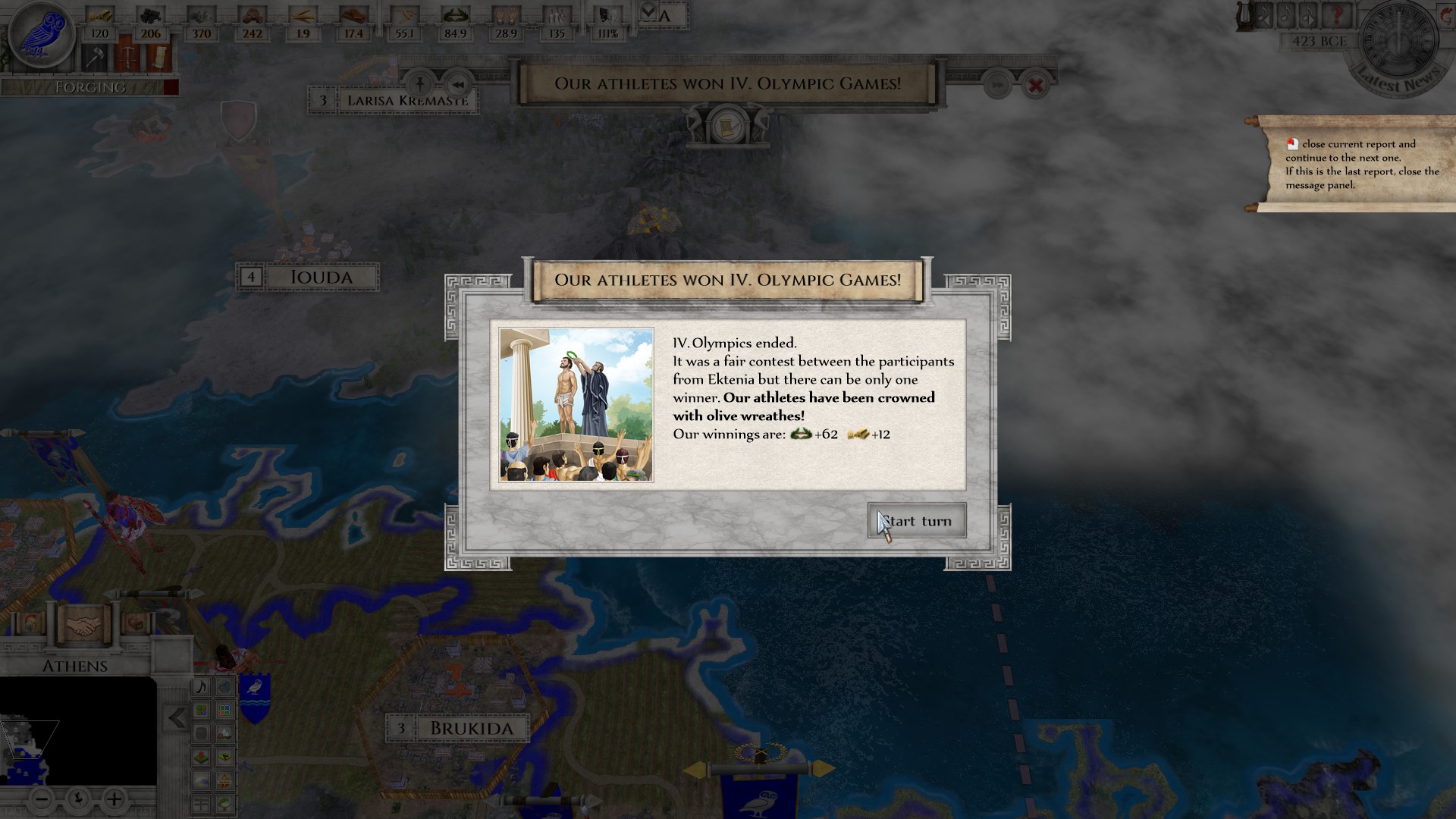
Slaves are another important difference between this game and other 4X games. A portion of your population are slaves. Slaves are necessary to keep up production, but if their population grows too big, then they’ll start spreading unrest. Exactly how big the penalty for having a large amount of slaves depends on your government type, with each having a different sweet spot. If the slave population is getting too big, then you can release some, turning them into regular citizens through state decisions, but it’s not free, so keeping your slave population just right is an important part of the game.
One big problem with the game is how it at times gives very vague information about what things do. You know what something improves, but you don’t know by how much. The manual gives more information, and there’s an in-game encyclopedia, but you should not have to dig through these to find out exactly what something does, and even with these, it’s not always entirely clear.
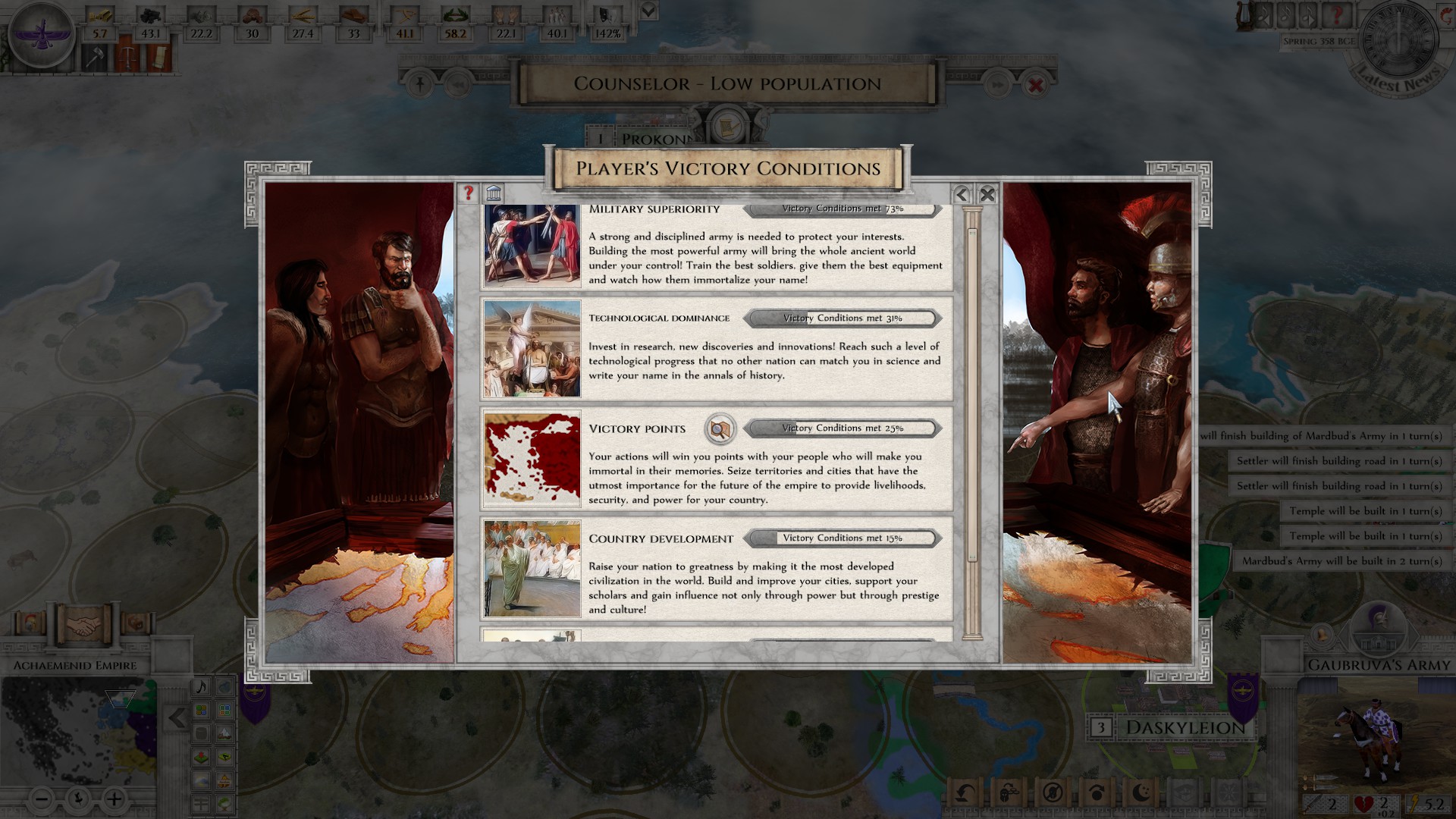
Closing Thoughts
There’s, of course, a lot more to the game than what’s mentioned above, but this should give you an overview. Imperiums: Greek Wars is a deceptively complex game.
My experience with Imperiums: Greek Wars was quite the rollercoaster ride. During my first hour with it, I was having quite fun. It reminded me of Civ 2 & 4, and it could be played like those games. Then all the things it did worse than Civ started to become apparent. There was not much in the way of unit variety, it did not feel as rewarding to research new technology, and there was less to do on the map. It felt like a more shallow version of the Civ series, but what I was doing was still similar enough to what I would do in Civ that the games felt comparable. And then I increased the difficulty. Suddenly all those things I did not have to worry about before started to matter, state decisions, slave population, general population growth in order to maintain armies and so on became important, and the game stopped feeling like a worse version of Civ 4. It’s rare for a change in difficulty to make such a big difference for how a game is played.
Imperiums: Greek Wars is a really good game, but if you’re going in with a lot of ideas on how a 4X game “should” work from past experiences with the genre, then chances are that the areas where it falls a bit short will be what you notice first. But give it a bit of time (and play on a difficulty that forces you to use most of the game’s systems), and you’ll be rewarded with a deep and rewarding strategy game.










